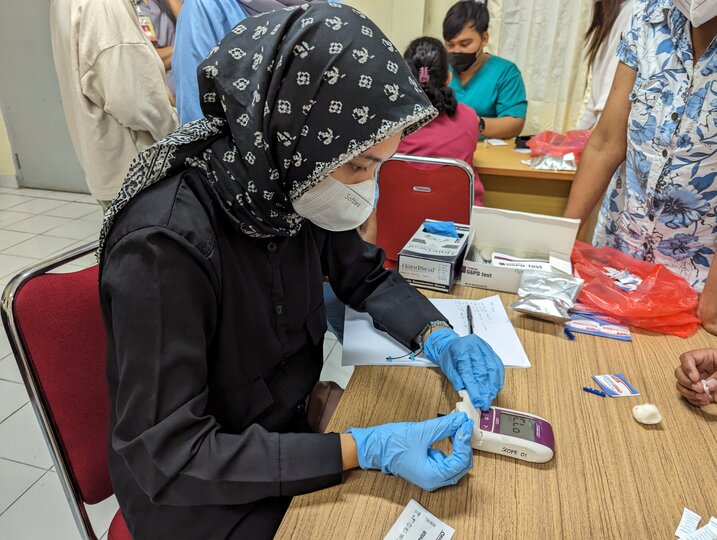SCOPE: Short COurse PrimaquinE for the radical cure of P. vivax
Shorter primaquine regimens for better adherence and fewer relapses
As part of the Partnership for Vivax Elimination (PAVE), Menzies School of Health Research and the Burnet Institute are sponsoring feasibility studies in Indonesia and Papua New Guinea (PNG), respectively. The studies known as ‘SCOPE: Short COurse PrimaquinE for the radical cure of P. vivax’ are looking at the safety, real-world feasibility and cost-effectiveness of providing point-of-care, glucose-6-phosphate dehydrogenase (G6PD) testing and a high-dose primaquine regimen over a shorter period (7 days in place of 14 days). The ultimate goal of these studies is to inform national policy makers so that these strategies can be implemented throughout Indonesia, PNG and potentially further afield, to reduce the burden of P. vivax malaria. The WHO has highlighted the need for additional evidence on the safety of short-course (7 days), high-daily-dose primaquine. These Unitaid-supported studies aim to contribute to addressing this knowledge gap.
Why we need real-world evidence on a short course, high-dose primaquine regimen
Although prevention of relapses is crucial for reducing transmission of P. vivax malaria, only two relapse-prevention drugs (primaquine and tafenoquine) are licenced. Primaquine (PQ) is the anti-relapse drug currently available in most endemic regions1, but its widespread impact on health outcomes is limited by poor adherence to the standard 14-day course and concerns over the risk of drug induced haemolysis in patients with G6PD deficiency.
Previously, assessing whether patients were G6PD deficient was difficult outside of well-equipped medical laboratories. The STANDARDTM G6PD Test, a quantitative, point-of-care test is now available and able to quickly determine the G6PD activity in patients' red blood cells to guide the selection of the most appropriate treatment regimen with either primaquine or tafenoquine.
For patients with normal G6PD activity levels, one treatment regimen is short-course (7 days), high-daily-dose primaquine, which initial studies have shown to have similar efficacy compared with the same WHO-recommended total dose of 7mg/kg body weight administered over 14 days in areas with high risk of relapse. This shorter primaquine regimen can lead to better adherence compared to the standard 14-day regimen and thus to fewer relapses. However, in some studies, the higher daily dose in the 7-day regimen (1mg/kg) is associated with more adverse events, particularly an increased risk of haemolysis and gastrointestinal events.
Study Design
The study has two stages:
Stage 1 will provide preliminary data from 4 study clinics on the safety and feasibility of short course (7-day), high-daily dose primaquine (PQ7) in patients with normal (>70%) G6PD activity. Following the conclusion of stage 1, a stringent safety assessment will be conducted to decide whether to proceed to stage 22. Assuming the decision is taken to move ahead following the safety review, the evidence gathered during stage 1 will be used to inform the main implementation which will take place in stage 2.
Stage 2 will study the cost-effectiveness and feasibility of routine implementation of G6PD testing, the revised treatment algorithm, patient education, supervision of the first dose and community review on day 3 at all 10 study clinics.
| G6PD Activity | Primaquine Regimen |
|---|---|
|
Normal (>70% G6PD activity) |
1mg/kg daily for 7 days Age >6 months and >5 kg in Indonesia Age >1 year in PNG |
|
Intermediate (30 - 70% G6PD activity) |
0.5mg/kg for 14 days Age >6 months and >5 kg in Indonesia Age >1 year in PNG |
|
Deficient (<30% G6PD activity) |
0.75 mg/kg weekly for 8 weeks Age >6 months and >5 kg in Indonesia Age >1 year in PNG |
1Currently single-dose tafenoquine is not indicated for use in combination with ACTs for blood-stage treatment, and therefore is not a treatment option for countries using ACTs for blood-stage P. vivax malaria infection such as Indonesia and Papua New Guinea.
2A Safety Review Team (SRT) as well as a Safety Monitoring Committee (SMC) will review the safety data at the end of stage 1.
